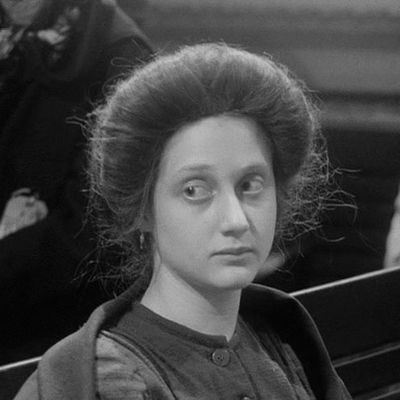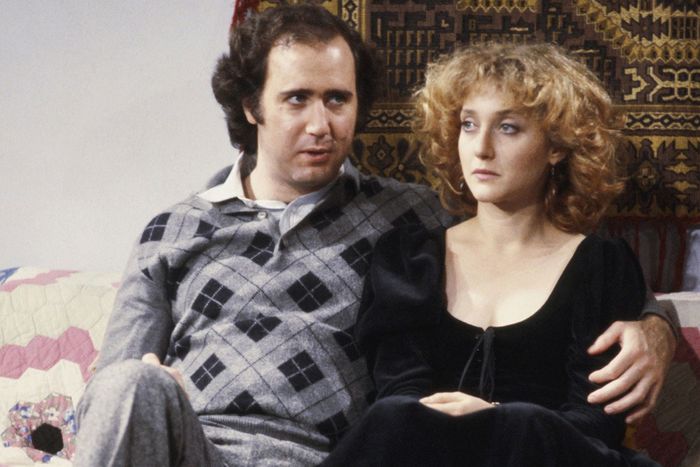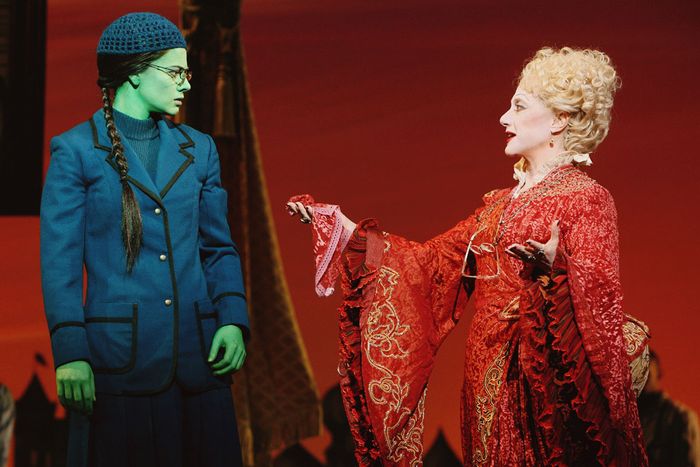
Carol Kane was just 23 when she appeared in 1975’s Hester Street, a gentle, low-budget black-and-white drama partly in Yiddish and set among Lower East Side Jewish immigrants at the turn of the century. Written and directed by Joan Micklin Silver (in her feature directing debut) and effectively self-distributed, the heartbreaking film turned out to be one of the unlikely indie sleeper hits of that year and garnered Kane a surprise Best Actress Oscar nomination. Parts in films such as Dog Day Afternoon (1975), Annie Hall (1977), Ken Russell’s Valentino (1977), Gene Wilder’s The World’s Greatest Lover (1977), and the horror classic When a Stranger Calls (1979) followed. (That latter title featured Kane in one of the most iconic, still-terrifying opening scenes in movie history.) In those early years, comedy might have seemed like something of a departure for the actress, but by the 1980s, she was seen primarily as a comic performer, thanks in part to her unforgettable, Emmy-winning turn as Simka, wife of Andy Kaufman’s Latka Gravas, on the immortal sitcom Taxi.
Now, Hester Street has been restored by the Cohen Film Collection and is being rereleased theatrically (and Micklin Silver, who passed away at the end of 2020, has belatedly gotten her due as one of the great directors of the 1970s). I talked to Carol Kane about her memories of making Hester Street, the shock of her Oscar nomination, the singular experience of Taxi, and her thoughts on a potential film version of Wicked, the hit Broadway musical in which she played Madame Morrible from 2005 to 2014.
When did you last see Hester Street, and what went through your mind as you watched it?
Joan [Micklin Silver] and I did a commentary for the DVD, I don’t know exactly how many years ago. That was the last time I saw it. I’m just incredibly proud of everything about it. It’s so beautifully made, and for no money. I had such an amazing opportunity so early in my life, so young. I think I did a good job — the more time goes by, the more I can embrace the quality of the work. There are some things I wish I had done better. I had to step up, you know, and I had help from a wonderful acting coach named Marilyn Fried, who worked very hard with me, and the language coach from the Yiddish theater.
The film was a small, independent release. It must have been a surprise when you got nominated for an Oscar.
It was an incredible shock! I owe it all to this one man named Max Burkett, who the Silvers somehow found. He was a retired PR person for one of the great studio heads back in the day. He had done Julie Christie’s campaign for Darling, where she actually won the award. He said, “I like to bet on a dark horse!” He literally went around Hollywood — he knew everyone in Hollywood — with cans of film to people’s homes, like Rosalind Russell’s house and Frank Sinatra’s house. He took the cans of film of Hester Street there, and they would have a dinner or something. After dinner, they would screen the movie, and Rosalind Russell would have invited, you know, ten of her other Academy friends to see it. That’s how I was nominated.
This was Joan Micklin Silver’s first feature. She went on to put out a great body of work, but she really should have gotten so many more opportunities.
Absolutely. In the normal course of events, with someone making a movie for very little money that made a great deal of money compared to what it cost, doors would have opened in Hollywood for such a person. But being a female director was a much more difficult path. It still is. Joan really suffered from that reality. Over the years, we were in touch, but not constantly. We did some readings of a play that she wanted to direct. And then I would see her at screenings that the great publicist Peggy Siegal would invite us to. I would see her and Ray Silver, her husband who produced the movie. Then, she was writing a book about the making of Hester Street, and we did a series of interviews at her apartment for it. I don’t know what’s happened to that book. I’m praying that maybe her daughter will continue and finish it. I was also lucky enough to get to see Joan toward the end, with my friend, Celia Weston, which I’m grateful for.
What’s your most vivid memory from making Hester Street?
I was just thinking about that as you asked about the film. I remember that I needed a private space to prepare. We were in this little tiny studio on East Fifth Street — just a teeny, tiny ancient place. I remember they found me an area: It wasn’t even a room, but an area up in the catwalk, way up high, where I could be by myself. I don’t know why that just jumped into my mind. I was also thinking about the scene where my husband’s lawyer comes over to offer me money to divorce him. I don’t say anything for the whole scene, and the lawyer misinterprets me not saying anything, so he just offers me more and more money. I end up with all the money, and that wasn’t my character’s intent. I’m just so appalled and devastated that he would have done that — that he would have sent this man to me. It was like a silent-movie moment. I really love that. The less talking the better, as far as I’m concerned.
You eventually became known primarily as a comic actor, but your early career is filled with amazing performances in dramas and horror films and other things I would not call comedies. Hester Street, When a Stranger Calls, Dog Day Afternoon. Were you planning to be more of a dramatic actress?
I had never done any comedy! I thought I’d be a dramatic actor since that’s what I was. But then somehow Gene Wilder saw Hester Street. I hadn’t worked for a year after I was nominated — a solid year. I got a phone call from Gene about doing The World’s Greatest Lover, which was my first comedy. I also think Jim Brooks from Taxi had seen Hester Street, and that’s how that came to me. So oddly enough, the first two comedic roles that I played came from Hester Street.
Are you surprised that more dramatic work didn’t come your way?
I guess I was, to some extent, but I also have to take responsibility for the fact that I had some weird trouble handling my young success. I pushed it away. I went through a period of finding reasons to not take a couple of major films that would have continued me down the path that I was on. I just had trouble handling it. When I finally realized I was mistaken to push these things away, they were no longer there. And then people started thinking of me as a comedic actress, and that pretty much stuck until very recently. I mean, I did theater that was dramatic, and recently I had the privilege of doing a television show called Hunters, which is a very dramatic role for me. That was a nice twist of fate.
And it reunited you with Al Pacino, from Dog Day Afternoon …
I know! And that was so much fun for me and because we did Dog Day Afternoon, but we also did several plays. We did two versions of The Resistible Rise of Arturo Ui, by Bertolt Brecht. Al is so passionate about his theatrical work. He’s just fantastic onstage. So there was a period where we worked together quite a bit and then not for a million years. Then suddenly there we were again on Hunters.
For many years it was the case that if you were on a successful TV show, people associated you so much with that character that it became hard to break free and do something different. Do you feel like you wound up getting pigeonholed a bit because you were so memorable on Taxi?
Maybe, but I wouldn’t trade it for anything because the experience of working on Taxi is still so alive for all of us. It’s hard sometimes for people to know what they have when they have it, you know, but Tony, Danny, Marilu, Chris, Judd, we all knew while we were there that we had landed in gold to be part of that show. We continued to stay very close. So if I got a little branded, it was worth the trade-off.
The language that Latka and Simka use, was that just completely improvised or did it have any rules? Did you guys develop it?
First of all, Andy Kaufman developed it, so credit where it’s due. He had a character that he used to do in his stand-up, or I would call it performance art, who was Foreign Man. That’s where that came from. And then they hired him for Taxi and Foreign Man became Latka. I’ve told this story before, but Jim Brooks and director Jim Burrows enlisted Andy to teach me the language, because it had a very specific rhythm and there were a few words, like yaktahbay and whatever, that were consistent. The lines were written in English, so we knew exactly what we were saying. Andy said, “We’ll go to dinner.” I went to his house up in the Hills and he had his bongos there and everything. When I got there, he said to me, “I thought we should go someplace where no one knows us so that we can speak in the language. I’ll ask you in English what you want, and then you’ll answer me in the language and then I’ll order it for you. So I thought we should go to Mexico.” This is like seven at night, we’re in L.A. But I took a deep breath internally and thought, Okay, if he wants to go to Mexico, we’ll go to Mexico because I’m here to learn from him.
Then he disappears into the kitchen, and he’s on the phone for like half an hour with one of his many girlfriends — because he was quite a ladies’ man, which none of us at Taxi knew anything about. Finally, I started losing my patience. I went into the kitchen and I said, “Andy if we’re going to go to Mexico, I really think we better get going.” And he looked at me like I was out of my mind. I believed him that we were going to Mexico! But he was completely believable. As any student of Andy Kaufman’s performance art knows, he never broke character. There was no line there where you could say, “Oh, this is Andy joking.” I couldn’t tell he was joking at all. And I’m pretty intuitive.
So then we drove to a Chinese restaurant in Los Angeles as opposed to Mexico. And we did just what he said, we got the menu and I told him what I wanted, and when the waiter came, he asked me in the language, and I responded in the language, only in the language. And then he translated to the waiter what I had ordered in English. We did that for a meal, for an hour or so. I asked him how he created the language. He said, “You know, it’s like when you’re a kid and you open your mouth and you pretend you’re speaking Russian or whatever.” He had that nonjudgmental impulse as an artist of when you play as a child and make something up and you don’t think, Oh, I hope I did that right. You just do it. That’s what Andy did; he just did it. That’s what the language was for Andy. But it always had consistent rhythm, so what I did had to reflect what he did, because we had to be from the same place.
People always talk about your distinctive voice when it comes to your comic performances, but you’re also a very gifted physical comedian. I watched Scrooged again last week, and your scenes in that are phenomenal, where you’re just beating the shit out of Bill Murray. Is that something you have to work on a lot in advance, or can you improvise it?
I think both. It depends. But on Taxi, Jimmy Burrows would give us some physical suggestion. And my character was always throwing herself on the ground in Taxi. The episode where I had my kremkapush, which is, you know, my period, I was going insane. I was throwing myself on the ground, beating the ground in hysteria and everything. Some of that came with permission from Burrows or Brooks. Some of it just came from the fact that you feel well protected that nobody will let you make a fool of yourself. If you feel safe, you can be brave enough to try big stuff and go all the way and commit fully. You know that if it’s too much or not believable, they will stop it. So I was able to really experiment.
Do you think a Wicked movie will ever happen?
[Audible gasp.] I don’t know anything about that! I sure would love it. I’d love to play Madame Morrible again, which I did for many, many years. I love that part. I wish a movie would happen, but I didn’t know anything about it. Is it being announced with Stephen Daldry?
Last I heard, Jon M. Chu was going to direct it. But I think it keeps getting delayed.
My honest guess would be that it probably will happen, because why wouldn’t it happen? What’s so genius about the musical onstage is that they’ve been able to create this complete fantasy world so thoroughly. The sets and the costumes and the special effects, the animatronics … not animatronics, what do they call it? The automation! The automation, I’ve heard that word thousands of times. “The automation is broken!” “The automation is off!” And the lighting and smoke and all of that conspires to feel even more fantasy-like than a movie. And The Wizard of Oz to me is the most magical of those fantasy movies still. It was made so long ago, before they had any of the special effects that they have now, before CGI or green screen, and yet it takes you to another world. And the musical of Wicked does that. It must be a movie!
The Hester Street restoration will play at the Quad Theater beginning Friday, October 1.







